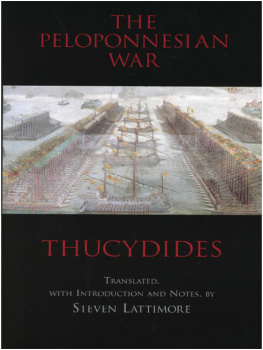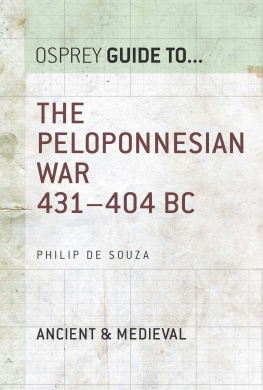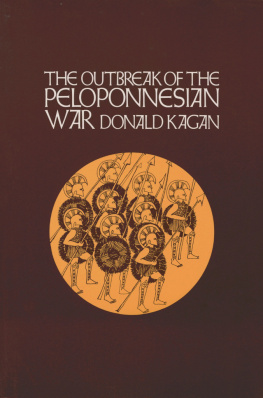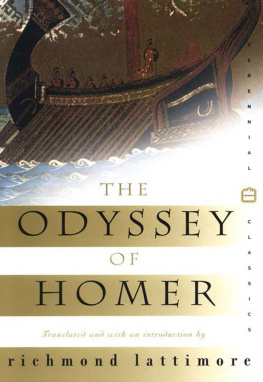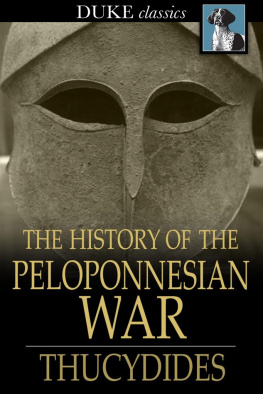Lattimore Steven - The Peloponnesian war
Here you can read online Lattimore Steven - The Peloponnesian war full text of the book (entire story) in english for free. Download pdf and epub, get meaning, cover and reviews about this ebook. City: Cambridge;Indianapolis;Ind, year: 2002;2012, publisher: Hackett Publishing Company, Inc., genre: Politics. Description of the work, (preface) as well as reviews are available. Best literature library LitArk.com created for fans of good reading and offers a wide selection of genres:
Romance novel
Science fiction
Adventure
Detective
Science
History
Home and family
Prose
Art
Politics
Computer
Non-fiction
Religion
Business
Children
Humor
Choose a favorite category and find really read worthwhile books. Enjoy immersion in the world of imagination, feel the emotions of the characters or learn something new for yourself, make an fascinating discovery.
- Book:The Peloponnesian war
- Author:
- Publisher:Hackett Publishing Company, Inc.
- Genre:
- Year:2002;2012
- City:Cambridge;Indianapolis;Ind
- Rating:5 / 5
- Favourites:Add to favourites
- Your mark:
- 100
- 1
- 2
- 3
- 4
- 5
The Peloponnesian war: summary, description and annotation
We offer to read an annotation, description, summary or preface (depends on what the author of the book "The Peloponnesian war" wrote himself). If you haven't found the necessary information about the book — write in the comments, we will try to find it.
The Peloponnesian war — read online for free the complete book (whole text) full work
Below is the text of the book, divided by pages. System saving the place of the last page read, allows you to conveniently read the book "The Peloponnesian war" online for free, without having to search again every time where you left off. Put a bookmark, and you can go to the page where you finished reading at any time.
Font size:
Interval:
Bookmark:
AHB: Ancient History Bulletin
AJP: American Journal of Philology
BICS: Bulletin of the Institute of Classical Studies, University of London
CA: Classical Antiquity
CJ: Classical Journal
CP: Classical Philology
CQ: Classical Quarterly
GRBS: Greek, Roman and Byzantine Studies
HCT: Historical Commentary on Thucydides
JHS: Journal of Hellenic Studies
LCM: Liverpool Classical Monthly
PP: La Parola del Passato
TAPA: Transactions of the American Philological Association
In a long and characteristically intricate sentence, Thucydides begins by introducing himself and his subject. For the latter, he claims a unique magnitude, justifying this in part by putting forward what he regards as the first reasonably accurate survey of early Greek history, the Archaeology; sea power, a great leitmotif in book 1, is given special prominence. The methods he uses here illustrate the ones he intends to follow throughout his work: objectivity, careful examination of all evidence, avoidance of mythology and story-telling; the speeches, however, must not be taken as transcripts of all that was said. The first two of these (Thucydidean speeches are frequently paired) are in the context of the events leading to the outbreak of war. Thucydides expresses his hope to have made clear for all time the causes, both immediate and long-term, of the Peloponnesian War. The most important of these, the growth of Athenian power and Spartan fear of it, lead him to survey the period of ca. 479433 B.C.E., the Pentakontaetia. Returning to the immediately prewar period, he describes the assembly at Sparta in which the Peloponnesian alliance reached the decision to declare war. Final negotiations with Athens are the occasion for the prewar stories of Kylon, Pausanias, and Themistokles, told in an uncharacteristically straightforward and entertaining style (this does not necessarily reflect Herodotean influence and would not necessarily be early writing on that account). At the conclusion of the book is the first of three speeches Thucydides gives Perikles, notable for its optimistic assessment of Athenian strength and concomitant intransigence.
Book 1 is the most ambitious and original portion of Thucydides work; it is also the most controversial of the eight books. Book 1 confronts the reader squarely with the so-called Thucydidean question: Which passages were composed at which date? Equally central is the newer, post modernist question: What sort of historian was Thucydides, and how accurate? Every major feature of book 1 has been called seriously flawed. The justification of his subject has been seen as rhetorical exaggeration; the Archaeology, as full of naive anachronisms and overcredulous (despite Thucydides several disclaimers) in its use of Homer. Thucydides policy on recording speeches has been found confused, even contradictory; his practice, deficient in whatever accuracy he meant to claim. Rather than proving definitive, his analysis of the causes of the war has been controversial enough to generate exhaustive modern debate, and some have seen here something less pardonable in a historian than confusion or obscurity: an attempt, after the event, at an apologia for Periklean Athens, even a programmatic falsification of genuine Spartan attempts to avoid the conflict. The stories about Kylon, Pausanias, and Themistokles are conceded more charm than authenticity.
For all its problems and controversies, the survival of book 1 alone would have assured us that Thucydides was a writer of exceptional intellectual and artistic power.
The Peloponnesian War begins with a Theban attack on Plataia; in the first of a series of excitingly written narratives involving the Plataians, the Thebans fail and are harshly dealt with. Both sides now consider the Thirty-Year Peace (dating from 445) at an end and mobilize. Led by the Spartan king Archidamos, the Peloponnesians invade and ravage Attica, whose evacuation causes the Athenians great physical and emotional suffering; while offering only token resistance, they begin their own annual invasions of the neighboring territory of Megara and also send a large Athenian and Corcyrean fleet to plunder the Peloponnesian coast. Thucydides describes the elaborate public funeral for the Athenian casualties of the first war year and records the eulogy by Perikles, which commemorates the achievements and ideals of Athens as well as the courage of the men themselves.
Early in the second year, Athens is devastated by a plague, whose terrible symptoms Thucydides describes as one who was stricken and was fortunate enough to survive. He does not mention the plague as the cause of Perikles death in the following year but uses the plagues aftermath as a setting for an obituary before the event. The disease not only kills a great number of Athenians but also leaves the surviving population in a mood of cynicism and lawlessness, which provides the sharpest possible contrast with the Athens both described and addressed in Perikles funeral oration. The Athenians of this depressed city first send ambassadors to Sparta to discuss peace, unsuccessfully, and then angrily turn on Perikles; he responds with an uncompromising speech defending his war policy, his qualities of leadership, and the necessity of making every personal sacrifice to preserve an empire whose glory will outlast the hatred it now admittedly inspires. In response, the Athenians deposed and fined him. His speech is his final appearance in Thucydides, who complements the speech with a long chapter commending Perikles for his control over the people and the prudence of his advice to them; the war was lost by his successors, self-serving demagogues responsible for series of mistakes, notably the Sicilian expedition. This is the most explicitly postwar passage in Thucydides and among the most vexed, because the indictment of Athenian politicians is notoriously difficult to reconcile with his overall account.
Taken together, the sequence of Periklean speeches, especially the final one, juxtaposes Perikles function of alternately encouraging and restraining the Athenians and the problem of imposing a relatively passive strategy, which demanded considerable patience and self-sacrifice on a dynamic and adventurous people. While Thucydides did not design book 2 as a unit, its subsequent events indicate a troubled period for Athens with Perikles first out of power and then, shortly after his re-election, dead. The Athenians successfully conclude the siege of Potidaia they had begun shortly before the war, but at the cost of some dissension among themselves and without ending revolts in the area. The Peloponnesians begin a siege of Plataia, a close ally to whom the Athenians can send only minimal help; even though this is in accordance with Perikles strategy, the Athenians also demand resistance, brave and resourceful but ultimately doomed, on the part of the Plataians. Phormio wins a pair of important naval victories in the gulf of Corinth, but the second of these involves a last-minute reversal of impending and disastrous defeat in a situation created by Athenian mismanagement. Furthermore, a direct response on the part of the Peloponnesians is a surprise raid against Salamis; even though its failure is further indication of the inferiority of Peloponnesian seamanship, Thucydides insists both on its near-success and on the extreme panic it caused in Athens. The book ends on a note of anticlimax suggestive of missed Athenian opportunities. Sitalkes, a Thracian ally, who was not there to help when the Athenians suffered a sharp defeat by rebellious Greeks in the Chalkidike, campaigns against these same Greeks with almost grotesquely large forces (whose mustering from many local tribes Thucydides describes in detail) and at first strikes terror; but partly because of the difficulty of provisioning his huge army with winter approaching, partly because expected Athenian land and naval forces never materialize (because they in turn did not believe he would come), he withdraws before doing appreciable damage.
Next pageFont size:
Interval:
Bookmark:
Similar books «The Peloponnesian war»
Look at similar books to The Peloponnesian war. We have selected literature similar in name and meaning in the hope of providing readers with more options to find new, interesting, not yet read works.
Discussion, reviews of the book The Peloponnesian war and just readers' own opinions. Leave your comments, write what you think about the work, its meaning or the main characters. Specify what exactly you liked and what you didn't like, and why you think so.

